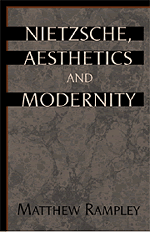Book contents
- Frontmatter
- Contents
- List of Abbreviations
- Acknowledgements
- Introduction
- 1 Truth, Interpretation and the Dialectic of Nihilism
- 2 Nietzsche's Subject: Retrieving the Repressed
- 3 Laughter and Sublimity: Reading The Birth of Tragedy
- 4 Wagner, Modernity and the Problem of Transcendence
- 5 Memory, History and Eternal Recurrence: The Aesthetics of Time
- 6 Towards a Physiological Aesthetic
- 7 Art, Truth and Woman: The Raging Discordance
- 8 Overcoming Nihilism: Art, Modernity and Beyond
- Notes
- References
- Index
2 - Nietzsche's Subject: Retrieving the Repressed
Published online by Cambridge University Press: 18 March 2010
- Frontmatter
- Contents
- List of Abbreviations
- Acknowledgements
- Introduction
- 1 Truth, Interpretation and the Dialectic of Nihilism
- 2 Nietzsche's Subject: Retrieving the Repressed
- 3 Laughter and Sublimity: Reading The Birth of Tragedy
- 4 Wagner, Modernity and the Problem of Transcendence
- 5 Memory, History and Eternal Recurrence: The Aesthetics of Time
- 6 Towards a Physiological Aesthetic
- 7 Art, Truth and Woman: The Raging Discordance
- 8 Overcoming Nihilism: Art, Modernity and Beyond
- Notes
- References
- Index
Summary
We think that hardness, forcefulness, slavery, danger in the alley and the heart, life in hiding, stoicism, the art of experiment and devilry of every kind, that everything evil, terrible, tyrannical in man, everything in him that is akin to beasts of prey and serpents, serves the enhancement of the species “man” as much as its opposite does.
(BGE §44)In the previous chapter I argued against overplaying the purely sceptical moment in Nietzsche's critique of metaphysics at the expense of his reconstructive theory of interpretation. Critics of a variety of persuasions have tended to dichotomise the issues at stake within his work, as if it merely revolves around an opposition between rationality and irrationality. Nietzsche's embrace of the other of metaphysical reason, seen in such terms has made him the object of some considerable censure. For example, Habermas, using the case of The Birth of Tragedy, sees Nietzsche as striving for regression to a mythic primal origin, a goal that prepares the way both for Nazism and also for the thought of a figure such as Martin Heidegger. Discussing Heidegger, Habermas writes, ‘It is only after this turn that fascism, like Nietzsche's philosophy, belongs to the objectively ambiguous phase of the overcoming of metaphysics.’ Though he stops short of labelling Nietzsche's work as fascist, in the manner of Lukács's crude assault, its problematic and ambiguous status lends easily to association with fascist thinking. In contrast, thinkers such as Bataille, Deleuze, Sarah Kofman and Jacques Derrida have received Nietzsche with a sense of exhilaration, as providing a mechanism of release from the tyranny of logic and rationality, opening up language to the play of metaphor.
- Type
- Chapter
- Information
- Nietzsche, Aesthetics and Modernity , pp. 50 - 77Publisher: Cambridge University PressPrint publication year: 1999



